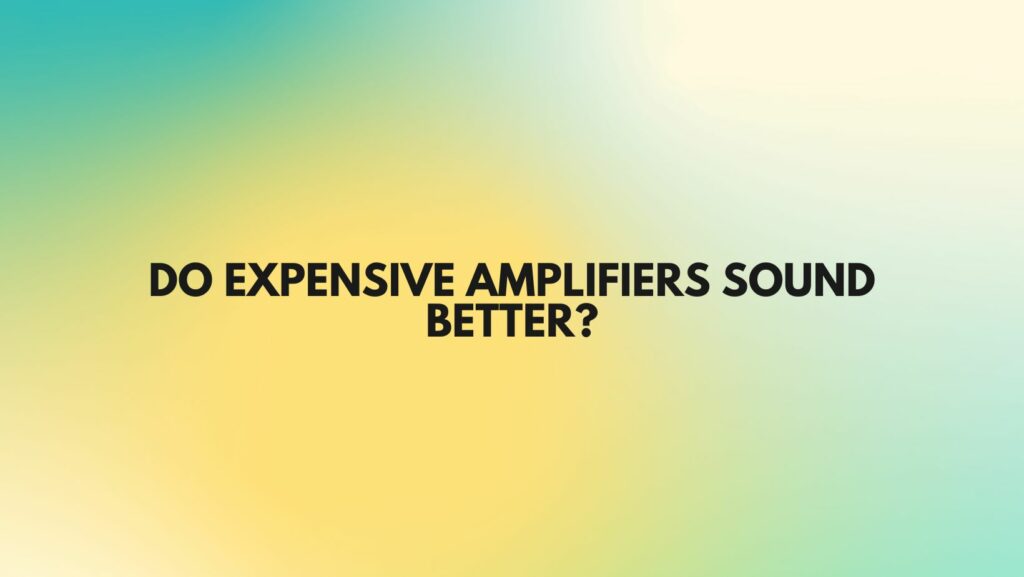The audio world is filled with debates about what makes a sound system truly exceptional. One recurring question is whether expensive amplifiers deliver significantly superior audio quality compared to their more affordable counterparts. In this comprehensive article, we’ll explore the factors that influence amplifier performance, the role of price in the equation, and whether spending more money on an amplifier truly results in a better listening experience.
Understanding Amplifiers
Before delving into the debate, it’s crucial to understand what an amplifier does and how it contributes to the overall sound quality of a music or audio system.
An amplifier, in its most basic form, is designed to increase the amplitude of an electrical audio signal. It takes a weak input signal, such as the output from a source like a CD player, turntable, or digital stream, and amplifies it to a level suitable for driving speakers. The goal is to faithfully reproduce the audio signal without introducing distortion, coloration, or noise.
Factors Influencing Amplifier Performance
Several factors play a role in determining the quality of an amplifier’s performance:
- Power Rating: Amplifiers are rated in watts per channel. The power rating should be appropriate for your speakers and listening environment. Having too little power can lead to distortion, while too much power can damage speakers.
- Signal-to-Noise Ratio (SNR): A higher SNR indicates less noise in the amplified signal, contributing to cleaner sound quality.
- Total Harmonic Distortion (THD): Lower THD means less distortion in the audio signal, resulting in more faithful reproduction.
- Frequency Response: A flat frequency response across the audible range ensures that the amplifier doesn’t color the sound by emphasizing or attenuating certain frequencies.
- Damping Factor: A higher damping factor can provide better control over the movement of speaker drivers, particularly in low frequencies.
- Build Quality and Components: The quality of internal components, circuit design, and build materials can significantly impact performance. High-end amplifiers often feature superior components and craftsmanship.
Price vs. Performance
Now, let’s address the central question: Do expensive amplifiers sound better?
- Law of Diminishing Returns: Like many products, the relationship between price and performance in amplifiers follows the law of diminishing returns. While a high-end amplifier might offer marginal improvements in sound quality, these improvements become less noticeable as you move up the price scale.
- Matching Components: The overall quality of your audio system is determined by the weakest link. If your speakers, source, or room acoustics are not up to par, an expensive amplifier won’t magically make them sound better. It’s crucial to have a balanced and well-matched system.
- Subjective Preferences: Sound quality is subjective, and what sounds “better” varies from person to person. Some listeners may prefer the character or tonal characteristics of certain amplifiers, even if they don’t adhere strictly to the idea of “accuracy.”
- High-End Features: More expensive amplifiers may include features such as balanced inputs, advanced room correction, and more power output, which can be beneficial in specific scenarios but might not be necessary for all users.
Conclusion
While there is no doubt that a well-designed and high-quality amplifier can elevate your audio experience, it’s important to consider your individual needs and budget. For many listeners, a mid-range amplifier that provides ample power and clean amplification is more than sufficient. However, if you are an audiophile with a discerning ear and have a high-quality audio source and speakers to match, investing in a premium amplifier may yield subtle but appreciated improvements in your listening experience.
In the end, the decision should be based on a holistic assessment of your entire audio system, your listening preferences, and how much value you place on incremental sound quality enhancements. Remember that the “best” amplifier is the one that complements your setup and brings you joy in your music or movie-watching experience, whether it’s an affordable model or a high-end powerhouse.


